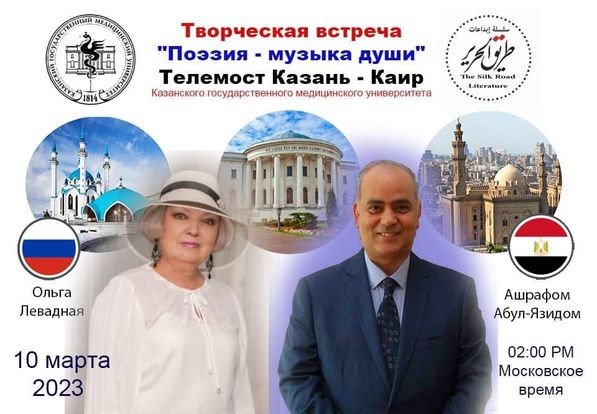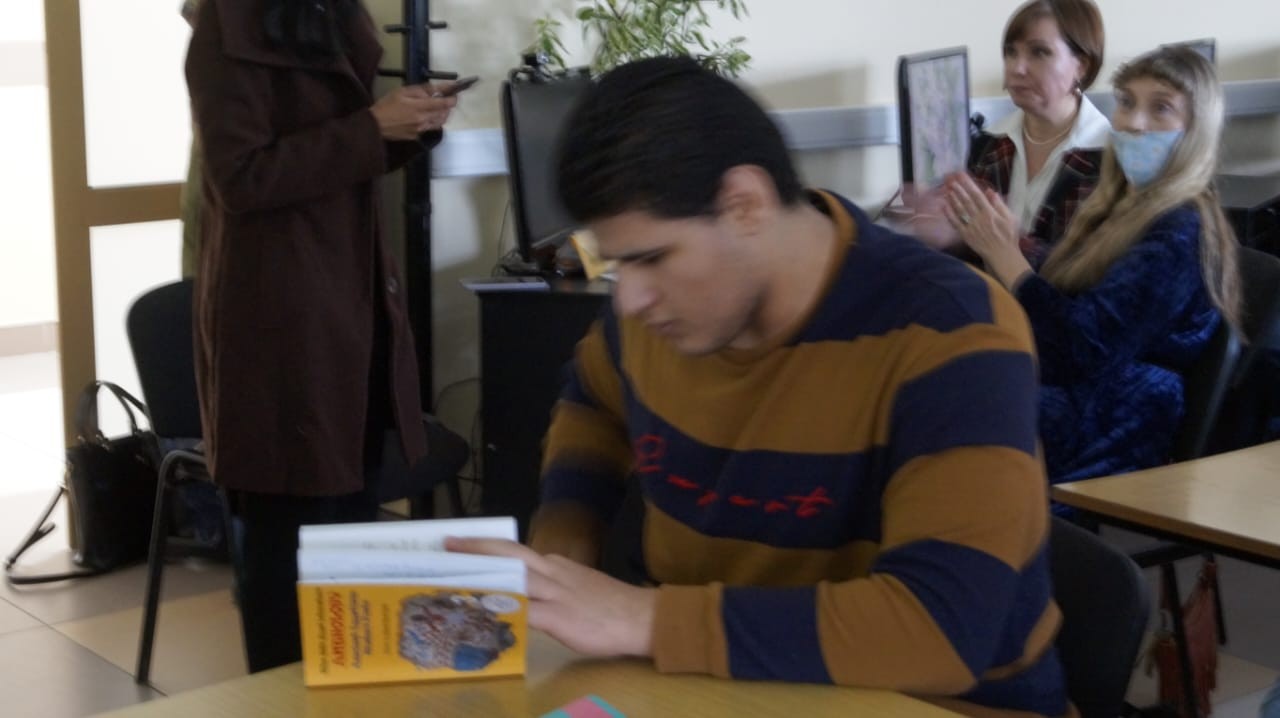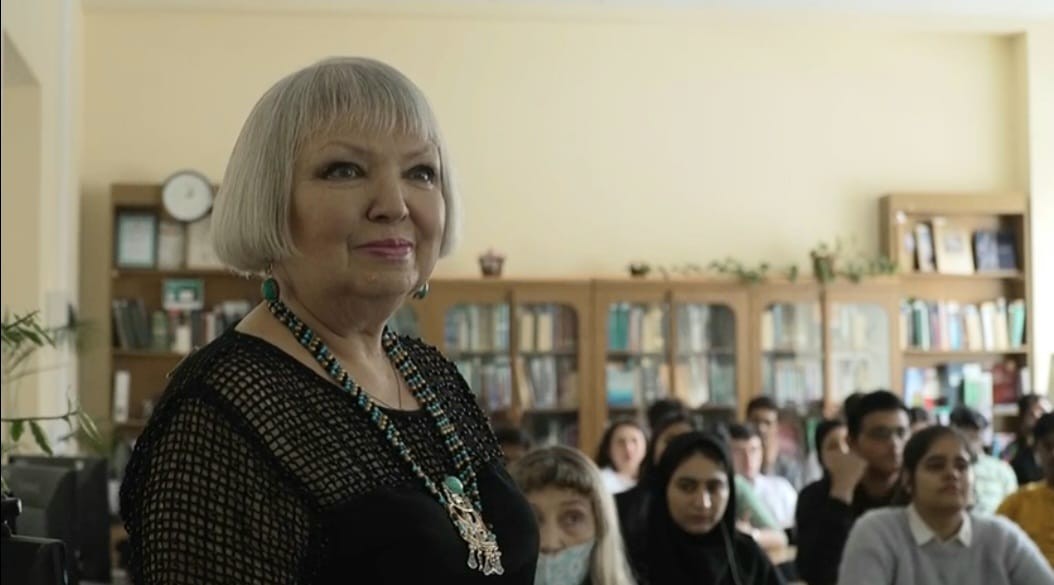Cairo – Kazan Creative Meeting was conducted today to celebrate poetry published in the Silk Road Anthology’s editions. The Creative Meeting was presented by Olga Chevela who introduced Ashraf Aboul-Yazid. A video entitled "From Kazan with love!" briefed the relationship between the Egyptian traveler, writer, poet and translator with the city of Kazan and the culture of Tatarstan; one of the Russian Federation’s republics.
 Ashraf Aboul-Yazid is the author and translator of 42 collections of poems, novels, travels and children's literature, including works by Gabdulla Tukay into Arabic, winner of the Manhae Grand Prix for Literature (Korea, 2014), Arab Journalism Award for Culture (2015), Gold Medal of the Eurasian Literary Festival LIFFT (2021), and Sawiris Award for Children's Literature (2023).
Ashraf gave a short speech on his literary works, and read two stories related to doctors as he was talking to the students in the Faculty of Foreign Students of Kazan State Medical University. A wall screen was showing video clips and live stream from Egypt and Russia, for the world future doctors:
“I have two short stories to tell related with medicine.
First one when I started my journalism career, I was a student at university. I decided to write about laser surgery of eyes; four decades ago this was a medical revolution. I explained to the doctor my wish to witness the operation. He accepted, and invited me inside the operation’s room of his clinic. A lady was on the bed, and another doctor was inside, as well. He was an anesthesiologist. It seemed that I got unconscious as I got up to find myself outside that certain operation room after breathing the smell of drugs. That was the first operation I attended as an eye witness.”
Ashraf Aboul-Yazid is the author and translator of 42 collections of poems, novels, travels and children's literature, including works by Gabdulla Tukay into Arabic, winner of the Manhae Grand Prix for Literature (Korea, 2014), Arab Journalism Award for Culture (2015), Gold Medal of the Eurasian Literary Festival LIFFT (2021), and Sawiris Award for Children's Literature (2023).
Ashraf gave a short speech on his literary works, and read two stories related to doctors as he was talking to the students in the Faculty of Foreign Students of Kazan State Medical University. A wall screen was showing video clips and live stream from Egypt and Russia, for the world future doctors:
“I have two short stories to tell related with medicine.
First one when I started my journalism career, I was a student at university. I decided to write about laser surgery of eyes; four decades ago this was a medical revolution. I explained to the doctor my wish to witness the operation. He accepted, and invited me inside the operation’s room of his clinic. A lady was on the bed, and another doctor was inside, as well. He was an anesthesiologist. It seemed that I got unconscious as I got up to find myself outside that certain operation room after breathing the smell of drugs. That was the first operation I attended as an eye witness.”
 His second story happened in Tatarstan : “I was in the way back to Kazan after attending the Sabantui festival in one of the villages at the skirts of the capital city when we visited a house of a merchant that became a museum. I saw a truck from Stalin era, my leg was hurt when the tail of the truck dropped and touched it. Friends who accompanied me were Elmira Hanem Bayram-Ali, and Raisa Hanem Safiullah, took me to a clinic before going to hotel. The patients were very kind and permitted me to go directly to the doctor, and not to wait for my turn. As you know, I was just a visitor with no medical insurance, but doctors granted treatment without paying . I believe that they were good examples of doctors and patients as well.”
Olga Chevela presented the students of the theater studio "Feloxenia". Translated from Greek, "phyloxenia" means "hospitality", which perfectly matches the atmosphere of the studio, as it brought together representatives of different ethnic groups. The creation of the studio is dedicated to the Year of Theater in Russia. Its artistic directors - were associate professors of the department of Russian and Tatar languages O.V. Chevel and S.I. Fedotov. A video was shown of a lovely song, students read the poems of world poets in their native languages: English, Spanish, Arabic and Hindi. All poems were published in the Silk Road Anthology editions.
For English, they read Ashraf’s poem “The Young Boy From Luxor”, dedicated to Hussein Abdel Rasoul:
“The sun rose, as a little boy of bronze from Luxor
was bringing water from the River Nile.
At site, a rest was taken by the famous explorer,
And workers were waiting a relief from the heat for a while.
Howard Carter was holding a head full of despair,
after wrong excavation for the fifth long year.
The boy who carried jars full of holy water,
looked for a break for fresh air.
Upon arriving at the Valley of the Kings and Queens,
The boy, whose name was Hussein Abdel Rasoul, stopped.
Feeling that the dancing jars would fall off his donkey,
“A reconnection is needed”, he whispered to no one but his heart.
He put one of them on the ground,
but it was hitting something solid around.
Curiosity prompted him to dig with a tiny axe he used to keep,
to find a cemetery ladder step, he thought.
The boy ran quickly to the British archaeologist,
“Mr. Carter, I found a step for a pharaonic tomb!”
Howard Carter escorted the boy in a hurry.
You all know, the rest is history.
Whenever I visit King Tutankhamun,
I salute the young King,
But I also show respect to the British archaeologist,
And I always remember, in pride, the young boy from Luxor.
The young boy found the way to the young king,
But history is a bird with more than a wing.
History has to be written more than once,
To celebrate Hussein, pray for him and dance.”
His second story happened in Tatarstan : “I was in the way back to Kazan after attending the Sabantui festival in one of the villages at the skirts of the capital city when we visited a house of a merchant that became a museum. I saw a truck from Stalin era, my leg was hurt when the tail of the truck dropped and touched it. Friends who accompanied me were Elmira Hanem Bayram-Ali, and Raisa Hanem Safiullah, took me to a clinic before going to hotel. The patients were very kind and permitted me to go directly to the doctor, and not to wait for my turn. As you know, I was just a visitor with no medical insurance, but doctors granted treatment without paying . I believe that they were good examples of doctors and patients as well.”
Olga Chevela presented the students of the theater studio "Feloxenia". Translated from Greek, "phyloxenia" means "hospitality", which perfectly matches the atmosphere of the studio, as it brought together representatives of different ethnic groups. The creation of the studio is dedicated to the Year of Theater in Russia. Its artistic directors - were associate professors of the department of Russian and Tatar languages O.V. Chevel and S.I. Fedotov. A video was shown of a lovely song, students read the poems of world poets in their native languages: English, Spanish, Arabic and Hindi. All poems were published in the Silk Road Anthology editions.
For English, they read Ashraf’s poem “The Young Boy From Luxor”, dedicated to Hussein Abdel Rasoul:
“The sun rose, as a little boy of bronze from Luxor
was bringing water from the River Nile.
At site, a rest was taken by the famous explorer,
And workers were waiting a relief from the heat for a while.
Howard Carter was holding a head full of despair,
after wrong excavation for the fifth long year.
The boy who carried jars full of holy water,
looked for a break for fresh air.
Upon arriving at the Valley of the Kings and Queens,
The boy, whose name was Hussein Abdel Rasoul, stopped.
Feeling that the dancing jars would fall off his donkey,
“A reconnection is needed”, he whispered to no one but his heart.
He put one of them on the ground,
but it was hitting something solid around.
Curiosity prompted him to dig with a tiny axe he used to keep,
to find a cemetery ladder step, he thought.
The boy ran quickly to the British archaeologist,
“Mr. Carter, I found a step for a pharaonic tomb!”
Howard Carter escorted the boy in a hurry.
You all know, the rest is history.
Whenever I visit King Tutankhamun,
I salute the young King,
But I also show respect to the British archaeologist,
And I always remember, in pride, the young boy from Luxor.
The young boy found the way to the young king,
But history is a bird with more than a wing.
History has to be written more than once,
To celebrate Hussein, pray for him and dance.”
 The second poem from the series of the Silk Road Anthology was Spanish, written by Teresa del Bosque, El Salvador.
The third poem was in Arabic, written by Egyptian poetess Deema Mahmood published in Ancient Egyptians, Modern Poets Anthology, entitled (Lotus Sepal):
The second poem from the series of the Silk Road Anthology was Spanish, written by Teresa del Bosque, El Salvador.
The third poem was in Arabic, written by Egyptian poetess Deema Mahmood published in Ancient Egyptians, Modern Poets Anthology, entitled (Lotus Sepal):
I kneel under the holy protection of ”Ra’a”
He wraps me with his arms, getting away from his heavenly throne
I close my eyes and raise my head towards his flaming rose
The wisdom inhales resoundingly from the wells of pores
This is the true divinity
What about us. Didn’t we run towards it arrogantly
Inside an arc of colors and lights that have not been weaned yet?!
Oh.. When we saw the boat of Genesis sailing in the raging sea and fog,
We shouldn’t have left the lotus flower alone carrying the cup of its brilliant tears and got busy with both of engraving "The Key to Life",
and decorating the gardens of peace with stars and wheat spikes.
Look to me while I had shivered at your scepter,
and I've been burning since the starting of talk
The greenness of the interpretation helped “Ramses” – when he was in his square -
He realized that your sweetest honey is still hidden for me in the Universe Kingdom
Put your hands on my knees
Yeah... like that
We are pledged for flapping before the eternity.
The last poem was in Hindi, written by Dr. Brajesh Kumar Gupta (Mewadev), and was published in “Arabian Nights, World Poems” Anthology.
Olga Chevela introduced poetess Olga Levadnaya who is a poetess, Honored Worker of Culture of the Republic of Tatarstan, laureate of the Republican Prize named after A.I. G.R. Derzhavin, Literary Prize of the Republic of Tatarstan named after. S. Suleymanova, and a member of the Union of Writers of the Russian Federation. Olga Levadnaya read her poems from the Silk Road anthology in Russian, followed by a romance to the verses of Olga Levadnaya sounds: music by Gulnara Timerbulatova, accompanies Evgeny Korolkov.
Olga Levadnaya also read Ashraf Dali's poem from his book "Street in Cairo" in Russian. The book was translated by Eldar Akhadov.
To surprise the Egyptian guest who will celebrate his birthday on March 13, all participants sang for him with a screen wishing a happy birthday!

Comments